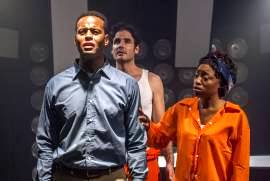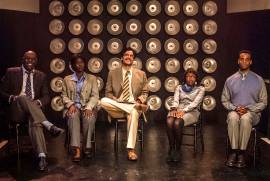
Growing up gay and black serves as the point of departure for Robert O’Hara’s hilarious, daring, provocative bunch of one-acts collectively titled Booty Candy, the latest from Celebration Theatre and the first in their spiffy new LGBT Center-adjacent digs at Hollywood’s Lex Theatre.
 Protagonist Sutter (Anton Peeples) doesn’t show up in all eleven of Booty Candy’s playlets, but his presence is felt throughout, from the moment we first meet him as a precocious child (“Mama, why do you call my weewee ‘booty candy’?) to the final scene (a touching visit between adult Sutter and his eighty-five-year-old granny).
Protagonist Sutter (Anton Peeples) doesn’t show up in all eleven of Booty Candy’s playlets, but his presence is felt throughout, from the moment we first meet him as a precocious child (“Mama, why do you call my weewee ‘booty candy’?) to the final scene (a touching visit between adult Sutter and his eighty-five-year-old granny).
Following that initial encounter with an elementary school-age Sutter clearly on-the-way-to-gay, we next meet him as a young man whose (straight white) childhood best friend has become considerably more than his brother-in-law, the twosome starring in a seduction scene which seems at first merely to be skewering self-declared hetero (but “gay curious”) men who’ll do anything but kiss (and I mean a-ny-thing) before then going on to reveal sexual abuse in Sutter’s teenage past that Sutter still regards as consensual, an attitude that only serves to compound the scene’s shock factor … and that’s even before learning the identity of the perv/perp.
A later sequence flashes back to a Michael Jackson-circa-Thriller Sutter’s revelation to his parents that a man has followed him home from the local library, a disclosure that inspires from his folks not concern that a predator might be after their 15-year-old son but a “blame the victim” reaction (“You need to take up some sports.” “You need to start bending your knees when you pick up stuff.” “This school year, no musicals.”) that is both comical and disquieting.
Disquieting doesn’t being to describe the next-to-last time we meet Sutter—on the night he decides (with the aid of a reluctant chum) to exert revenge on all those who’ve made him the butt of their racism and homophobia by going back to a drunk straight white guy’s hotel room with him and … (I’ll leave it up to you to imagine the rest.)
Early on in Booty Candy, the flaming preacher whose sermon takes an unexpected (to say the least) turn may appear to have no immediate connection with Sutter till you realize that the boy just might be one of the “sexually perverted” choir singers the minister’s congregation has been tongue-waggin’ about.
There seems to be even less of a link between our hero and the four women whose intersecting phone conversations revolve around the decision of one of them to name her unborn daughter Genitalia Lakeitha Shamala Abdul, but the scene’s ingenious conceit (two actresses with distinct left-side-right-side costumes/wigs each playing two different characters depending on which direction they’re facing) makes it one of Booty Candy’s most memorable, and hey, they could easily be members of Sutter’s church congregation.
 Later on, we meet a grown-up Genitalia, whose “noncommitment ceremony” to her previously committed same-sex partner Intifada features such delicious digs as “Wherever you go, I will not be, And I would like to add that you go fuck yourself.”
Later on, we meet a grown-up Genitalia, whose “noncommitment ceremony” to her previously committed same-sex partner Intifada features such delicious digs as “Wherever you go, I will not be, And I would like to add that you go fuck yourself.”
Most seemingly out-of-place is an Act One monolog that has the cast’s sole white member playing the near penniless victim of a street mugging. Then again, if you’re as observant as a certain member of Booty Candy’s opening night audience (not this reviewer), it might occur to you that we meet the same character again in Act Two … upon which his presence in the first act doesn’t seem all that inappropriate after all.
A couple of scenes (numbers 6 and 10) take a more meta approach. The first features a panel discussion between a clueless moderator and the supposed playwrights of four of Booty Candy’s first five scenes. (When one of the playwrights avers that he wants his audience to “choke,” the dopey moderator asks, “Are we talking auto-erotic asphyxiation?”)
 Later, a prison sequence has inmates playing the same characters we’ve just seen do the unthinkable.
Later, a prison sequence has inmates playing the same characters we’ve just seen do the unthinkable.
Mixed bag as all of the above might appear to be, taken as a whole they reveal method behind playwright O’Hara’s madness, and one of the reasons why Michael Matthews determined (even before its 2011 World Premiere at Washington D.C.’s Wooly Mammoth) that he would one day direct Booty Candy, a dream that has now come true at Celebration.
In fact, it’s hard to imagine a better fit between director and play than Matthews and Booty Candy, whose disjointed structure allows the Ovation Award winner’s prodigious imagination to run free, and never more so than in the ingeniously staged scene changes that are a Matthews specialty.
 The eclectic nature of Booty Candy’s near-dozen one-acts requires a cast as adept at broad comedy as they are at subtle (and at time stark) drama, and here too Celebration Theatre has lucked out, especially in the remarkably talented Peeples’ a-star-is-born lead performance. Whether pre-school charmer or irresistible 15-year-old Michael Jackson wannabe or out-and-proud (but hardly poster child) gay man, the acting newbie simply dazzles, and never more so than in a devastating centerstage solo meltdown that is indistinguishable from the work of a seasoned pro.
The eclectic nature of Booty Candy’s near-dozen one-acts requires a cast as adept at broad comedy as they are at subtle (and at time stark) drama, and here too Celebration Theatre has lucked out, especially in the remarkably talented Peeples’ a-star-is-born lead performance. Whether pre-school charmer or irresistible 15-year-old Michael Jackson wannabe or out-and-proud (but hardly poster child) gay man, the acting newbie simply dazzles, and never more so than in a devastating centerstage solo meltdown that is indistinguishable from the work of a seasoned pro.
Performance Of The Year Scenie winner Michael A. Shepperd follows his towering dramatic work in August Wilson’s Fences with one richly rendered featured character after another—flamboyant preacher man, well-meaning but bumbling dad, a gay-bar buddy who finds himself way too deep into a dangerous situation, and a grandmother whose memory may have faded but not her love for Sutter.
Booty Candy’s female contingent Travina Springer and Julanne Chidi Hill do stellar work as well. Each gets to play Sutter’s mother, and entertainingly so, but it’s as four very different, very over-the-top women in a single, outrageously funny scene (and later as a pair of formerly loving, currently hating, soon-to-be unhitched lesbians) that the duo steal scenes right and left.
Last but definitely not least is the superb Cooper Daniels, who doesn’t just get to be fabulous as a very new-agey, very gay noncommitment ceremony officiant but reveals formidable dramatic chops (and some full-frontal nudity) in Booty Candy’s starkest dramatic scene along with one riveting, ultimately quite relevant monolog.
 Booty Candy introduces Los Angeles audiences to the scenic design talents of new-kid-in-town actor Stephen Joshua Thompson, whose highly original, supremely imaginative set morphs in increasingly ingenious ways into one locale after another.
Booty Candy introduces Los Angeles audiences to the scenic design talents of new-kid-in-town actor Stephen Joshua Thompson, whose highly original, supremely imaginative set morphs in increasingly ingenious ways into one locale after another.
Lighting designer Matthew Brian Denman (working in close tandem with Thompson) once again reveals himself at the top of his craft while Rebecca Kessin’s disco-infused sound design adds pizzazz throughout, as do Michael O’Hara’s multitude of props.
Most inspired of all are Allison Dillard’s sensational costumes, with special snaps to a preacher’s peculiar brand of under(robe)garments, four women’s outfits worn by just two actresses in a single scene without a single costume change, and period-appropriate Sutter-wear as our hero goes from boy to man.
 Booty Candy is produced by Rebecca Eisenberg. Mark Giberson, Gino Marconi, and Tracey McAvoy are associate producers. Ryan Bergmann is assistant director. Marcedes L. Clanton is stage manager. Casting is by Jami Rudofsky.
Booty Candy is produced by Rebecca Eisenberg. Mark Giberson, Gino Marconi, and Tracey McAvoy are associate producers. Ryan Bergmann is assistant director. Marcedes L. Clanton is stage manager. Casting is by Jami Rudofsky.
All but one member of Booty Candy’s very talented understudy cast (made up of Nikita Calame, Chris Ferro, Constance Jewell Lopez, Parnell Damone Marcano, and Nicholas Anthony Reid) have themselves starred in previous Celebration Theatre productions.
Some playwrights play it safe and some theater companies do too. Such is not the case either with Robert O’Hara or Celebration Theatre. O’Hara’s rule-breaking, audience-provoking Booty Candy is Celebration at its rule-breaking, audience-provoking best.
Celebration Theatre at Lex Theatre, 6760 Lexington Ave., Hollywood.
www.celebrationtheatre.com
–Steven Stanley
October 29, 2105
Photos: Matthew Brian Denman
Tags: Celebration Theatre, Los Angeles Theater Review, Michael Matthews, Robert O'Hara



 Since 2007, Steven Stanley's StageSceneLA.com has spotlighted the best in Southern California theater via reviews, interviews, and its annual StageSceneLA Scenies.
Since 2007, Steven Stanley's StageSceneLA.com has spotlighted the best in Southern California theater via reviews, interviews, and its annual StageSceneLA Scenies.







 COPYRIGHT 2025 STEVEN STANLEY :: DESIGN BY
COPYRIGHT 2025 STEVEN STANLEY :: DESIGN BY